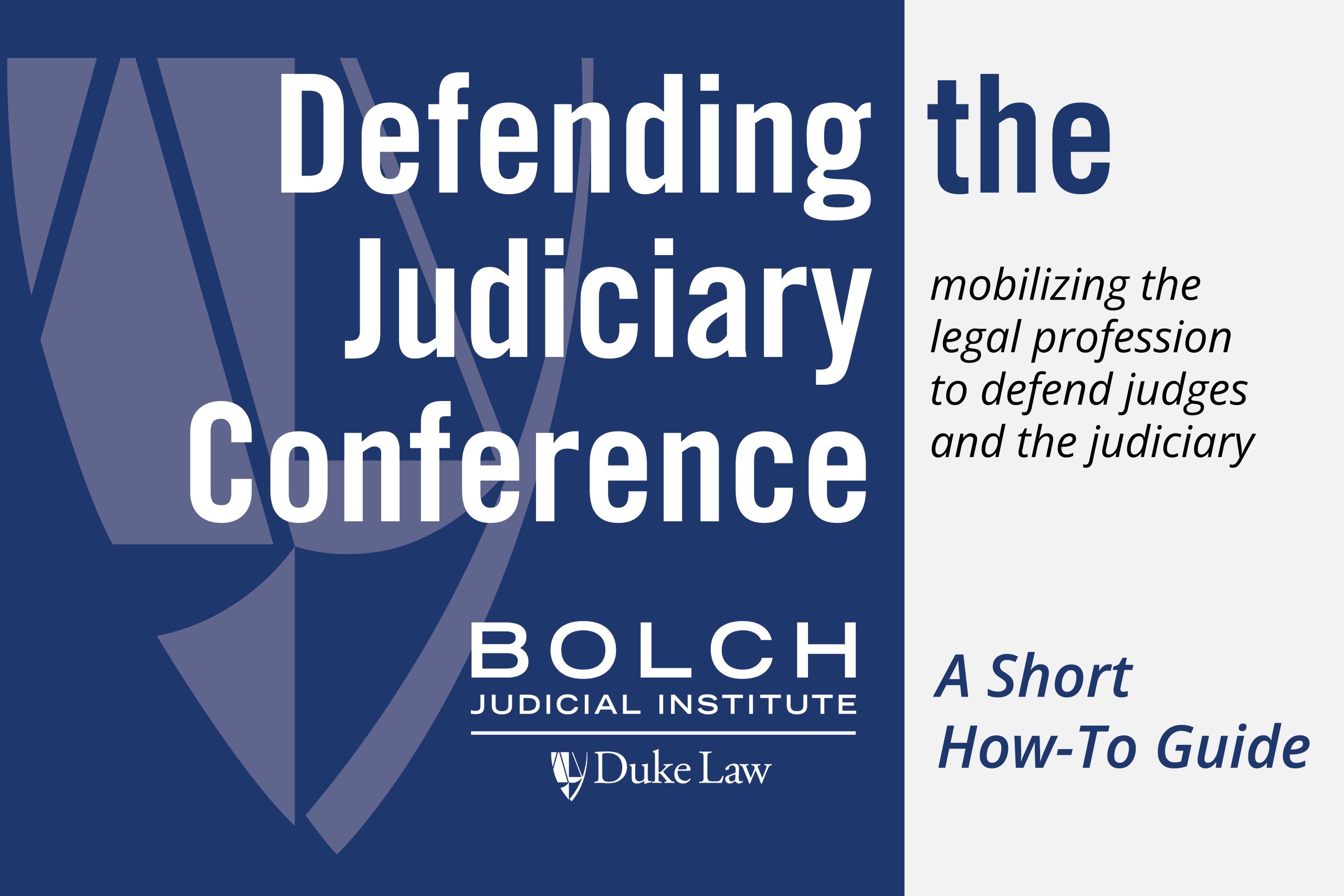Judges play a crucial role in upholding democracy and the rule of law. Threats against them — whether physical, online, or reputational — undermine judicial independence and erode public trust in the justice system. When judges fear for their safety, it can impact their ability to make fair, impartial decisions.
Likewise, misinformation, disinformation, and political attacks on judges contribute to a growing crisis of public confidence in the judiciary. This weakens the legal system’s legitimacy and makes it harder for courts to function effectively. This page summarizes key discussions from the Defending the Judiciary project and provides resources for those seeking to help respond to this growing crisis.
This short how-to guide contains information and resources specific to:
What can judges do?
Take steps to improve personal and courtroom security
- Install cameras, alarms, use data deletion services
- Report threats immediately to law enforcement and judicial protection units
- Participate in security training and situational awareness programs
- Work with law enforcement to develop long-term security protocols for courts and residences
Participate in efforts to educate the public about the role of courts and the work of judges
- Engage in controlled public outreach and civic education to build trust and transparency
- Where needed, advocate for judicial ethics code updates that allow fact-based responses to misinformation
Related Resources
Defending the Judiciary Duke Conference (videos and transcripts):
- Panel Discussion: Managing Security Challenges
- Panel Discussion: What Can Judges Do?
- Panel Discussion: Best Practices for Civic Education
- Panel Discussion: Improving Public Trust: What Can Courts Do?
Guidelines, Protocols, and Other Informational Resources:
- Disarming Disinformation—Guidelines for Courts to Combat Threats (PDF) (National Center for State Courts )
- Beyond Civic Education: Everyday strategies courts can use to regain public trust (National Center for State Courts)
- Federal Bar Association Educational Outreach Guidelines for Judges
- Considerations for Judicial Speech (Judge Robert Jonker)
- Security resources for judges (from Defending the Judiciary Conference presentations)
- Resources for judges on speaking out to defend the judiciary (from Defending the Judiciary Conference presentations)
- Civic education resources and presentations (from Defending the Judiciary Conference presentations)
What can lawyers and bar organizations do?
- Activate rapid response teams to counter misinformation and unfair attacks on judges
- Issue public statements supporting judicial independence when judges face threats and amplify similar statements from other organizations
- Promote ongoing civility and professional respect for judicial institutions in work with clients, colleagues, and the public
- Educate legal professionals on the impact of misinformation and the need for a strong, independent judiciary
- Participate in civics education programs in schools and community organizations to foster long-term public trust
- Organize and support public programs that allow judges to speak to community members
- Advocate for reforms in judicial selection to minimize political influence on courts
Related Resources
Defending the Judiciary Duke Conference (videos and transcripts)
- Panel Discussion — Ringing the Alarm
- Panel Discussion — What Can the Bar Do
- Panel Discussion — Disinformation, Misinformation & Threats
- Panel Discussion — How-to Session: Best Practices for Using Civic Education Opportunities
- Panel Discussion — How-to Session: Engaging with Media
Guidelines, Protocols, and Other Informational Resources:
- Guidelines for response to attacks against judges (American College of Trial Lawyers Judicial Independence Committee)
- Guidance for Lawyers Commenting on Judicial Decisions (PDF) (Lawyers for Civil Justice)
- Protocol for Responding to Unfair Criticism of Judges (ABOTA)
- Sample rapid responses to attacks (from Defending the Judiciary Conference materials)
- Model Rules for Bar Associations on Defending the Judiciary (from Defending the Judiciary Conference materials)
- How to put on a public forum on judicial independence (California Judicial Fairness Coalition)
- Civic education resources and presentations (from Defending the Judiciary Conference presentations)
What can policymakers do?
- Promote ongoing civility and professional respect for judicial institutions in work with colleagues and the public
- Demonstrate respect for judicial decisions
- Pass emergency legislation to protect judges’ personal information from doxing
- Strengthen law enforcement coordination to address immediate threats
- Support judicial security funding in state and federal budgets
- Encourage social media platforms to label and counteract misinformation about judges and the courts
- Help educate constituents on the role of the courts and the work of judges
- Participate in civics education programs in schools and community organizations to foster long-term public trust in the courts
- Push for systemic media literacy education to reduce public susceptibility to disinformation and misinformation
- Promote structural changes to judicial appointment and election processes to ensure fairness and impartiality
Related Resources
Defending the Judiciary Duke Conference (videos and transcripts)
- Panel Discussion — Managing Security Challenges
- Panel — What Can Judges Do
- Panel — Disinformation, Misinformation & Threats
- Panel Discussion: Improving Public Trust: What Can Courts Do?
Sample legislation relating to judicial security and independence:
- Daniel Anderl Act
- Countering Threats and Attacks on Our Judges Act
- Database of state legislation relating to judicial security and independence (National Center for State Courts)
- How to put on a public forum on judicial independence (California Judicial Fairness Coalition)
- Civic education resources and presentations (from Defending the Judiciary Conference presentations)
Click here to view and download a repository of resources on Defending the Judiciary.
